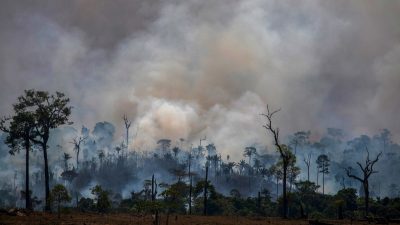(Still More) Bad News on the Doorstep
New Reports Document Accelerating Wildlife Extinctions, Global Deforestation Trends

While public attention in recent weeks and months has understandably focused on the COVID-19 pandemic and the racial justice shockwaves triggered by George Floyd’s tragic death, another disaster continues apace.
This week the New York Times published two alarming stories documenting the accelerating decline of our global environment. The first, entitled “Extinctions Are Accelerating, Threatening Even Human Life,” focuses on a new scientific report published by the National Academy of Sciences. It concludes that the planet is experiencing a rapidly accelerating pattern of wildlife extinction–one driven not by natural catastrophic events but, rather, human activity. Along with the devastation to wildlife populations, this trend if unabated will destroy global ecosystems and the human services they provide, including fresh water, pollination and pest and disease control.
The lead author of the study, Professor of Ecology Dr. Gerardo Ceballos of the National Autonomous University of Mexico, documents that in the past 100 years 543 species of terrestrial vertebrates have gone extinct–a rate of loss that would take 10,000 years under natural conditions. In other words,” observes Professor Ceballos, “every year over the last century we lost the same number of species typically lost in 100 years.”
Alarmingly, that trend is accelerating rapidly. The study concludes that if the status quo continues, another 500 species are likely to go extinct in just the next two decades–a rate of species loss that would take place naturally over 16,000 years.
This rapid pattern of species extinction is likely to threaten entire ecosystems, which in turn are likely to have profound effects on human societies. The study notes, for example, that the loss of honeybees just in the United States would trigger economic losses of over $15 billion.
It is well known that the major cause of global wildlife extinction is not hunting, trapping or other human predation but, rather, destruction of wildlife habitat. The second New York Times article in the newspaper’s June 3rd edition focuses on that disturbing phenomenon–specifically, the dramatic loss of tropical forests worldwide. “Going in the Wrong Direction: More Tropical Forest Loss in 2019,” profiles a new report from the World Resources Institute’s Global Forest Watch program. That report documents the fact that 2019 saw the global loss of some 9.3 million acres of tropical forests–an area the size of Switzerland. Fully one-third of those global losses occurred in the Amazon rain forest of Brazil alone. Deforestation of the Amazon through clear-cutting and intentionally-set wildfires is part of current Brazilian national development policy under President Jair Bolsonaro.
 Of course, another deleterious effect of this global deforestation trend is the fact that it eliminates huge, natural carbon sinks that tropical forests provide. The Global Forest Watch report notes that tropical forests losses in 2019 resulted in the release of over 2 billion tons of carbon dioxide–more than the emissions from all on-road vehicles in the United States in an average year.
Of course, another deleterious effect of this global deforestation trend is the fact that it eliminates huge, natural carbon sinks that tropical forests provide. The Global Forest Watch report notes that tropical forests losses in 2019 resulted in the release of over 2 billion tons of carbon dioxide–more than the emissions from all on-road vehicles in the United States in an average year.
These two environmental stories appeared on separate pages of the Times, but they could have just as easily been merged into a single journalistic tale of environmental calamity. That’s because destructive human actions like deforestation are devastating to a wide spectrum of plant and animal species already threatened with extinction.
The planet’s wildlife are increasingly imperiled by human-caused destruction of wildlife habitat. So too are humans themselves.
Reader Comments
One Reply to “(Still More) Bad News on the Doorstep”
Comments are closed.






I think you mean ‘the racial injustice shockwaves triggered by George Floyd’s murder by police’.